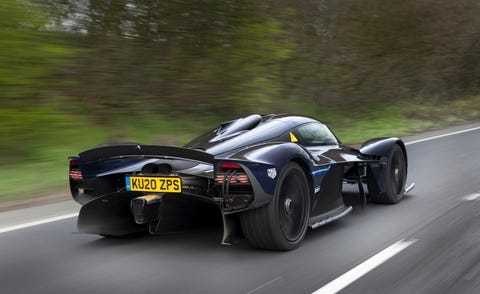
- Aston Martin CEO Tobias Moers tells Car and Driver that future plug-in supercars will switch to AMG V-8s, made by the company he once headed.
- A high-performance DBX and a plug-in hybrid are under development.
- Valkyrie deliveries will start this year, and an even more extreme track-only version is planned.
When Tobias Moers became Aston Martin’s CEO last August, there was no doubt the former boss of AMG would make radical changes to the crisis-hit sports-car maker. The first part of this was stabilizing Aston’s position, cutting unsold inventory, and streamlining its production process. The second, now underway, involves some radical alterations to the English manufacturer’s future model strategy.
Aston had already begun to develop two entirely new mid-engine supercars, the Valhalla and Vanquish, which were set to use a hybridized V-6 powerplant the company was to engineer itself. That new engine has now been canceled, with Moers telling C/D he arrived to find that development on it had hardly begun. “If that engine had been ready to go, I would have been happy to go with it,” he said, when we interviewed him in Aston’s Gaydon, England, HQ this week, “but it was not here, unfortunately—it was only at a concept stage.”
Instead, Moers confirmed, both Valhalla and Vanquish will use AMG-sourced V-8 engines, although these will be substantially different from the customer-spec motors the company currently uses in the Vantage, DB11, and DBX, and will effectively be built around the company’s requirements.
“We are going to create a bespoke engine for the Valhalla out of the V-8 toolbox of AMG, and the Vanquish will get another,” Moers said. “We will be able to make substantial changes, much more than before—you cannot just take a Black Series engine for example [that’s the one with the flat-plane crank] and put it into a mid-engine car. You need to change it. And we will do that ourselves.”
The V-8 engines will be integrated with a plug-in-hybrid system that Aston will design and engineer itself, and which won’t come from Mercedes, according to Moes. “An electric-drive front axle will be standard in that segment by then, so we will have to create that ourselves,” Moers said, “also a gearbox which is capable of electrification.”
Adding electrical assistance to both ends of the car suggests a layout similar to that of the Ferrari SF90 Stradale and one more advanced than that of the McLaren Artura, albeit some way behind it to market.
Before coming to Aston Martin, Moers was largely responsible for the forthcoming AMG Project One, the car that features a detuned Formula 1 powerplant. As the only person in the world to have driven prototype versions of both cars, he is uniquely placed to compare them.
“They are not rivals, they are totally different cars,” he said. “The Valkyrie is, from a car perspective, not really a car; it’s a two-seat Formula 1 experience. The Project One is much closer to a normal, standard vehicle, but one with a powertrain that is very bespoke.”
Moers said he has committed more Aston Martin engineering resources into delivering the Valkyrie, which will be reaching customers this year. Production of the hypercar has also been moved to Aston’s Gaydon factory as part of a dramatic simplification of the company’s manufacturing activities. The previous plan had been to build it in a different facility. Company insiders say that the proposed AMR Pro track-only version is also being redesigned and made even more extreme. Moers admitted to also be considering other possibilities for the Valkyrie’s Cosworth-built naturally aspirated V-12 engine. “It is a huge investment [for one car]. I try to be creative about what else we could do with that.”
As for Aston’s existing sports-car lineup—the Vantage, DB11, and DBS Superleggera—Moers said these will be freshened with heavy facelifts. Expect these in early 2023. However, these will not include hybrid powerplants, he clarified. Instead they will continue with pure combustion power until they are replaced, with the company’s existing twin-turbocharged V-12 likely to retire due to tougher European emissions standards by 2027. Beyond that, Moers confirmed that Aston’s next-generation sports-car platform will be EV.
More attention will be paid to the DBX range, delivering on the promise of range expansion made by Aston executive chairman Lawrence Stroll. The first variant will be a higher-performance derivative, due next year, with Moers saying this is targeted at offering more competition to the Lamborghini Urus: “Its life at the top is a bit too comfortable at the moment.”
Beyond that, a plug-in-hybrid version will follow in 2023, and it’s set to use the same AMG V-8 plug-in architecture, which will carry “73 AMG” branding when fitted to Mercedes models.
Plans to relaunch the long-dormant Lagonda brand were put on ice before Moers’s arrival, and the new CEO says it is likely to stay there for some time longer. “We just have to focus fully on Aston,” he said. “I like the idea of doing a Lagonda, but we have to keep it to one side at the moment.”
This content is imported from {embed-name}. You may be able to find the same content in another format, or you may be able to find more information, at their web site.
This content is created and maintained by a third party, and imported onto this page to help users provide their email addresses. You may be able to find more information about this and similar content at piano.io
Source link






